Cloth Diapers vs. Disposable Diapers: A Friendly Guide for Infant Families

-
Cloth Diapers: Earth-Friendly and Budget-Savvy
- The Eco-Friendly Angle
- The Budget-Friendly Aspect
-
Cloth Diapering: The Nuts and Bolts
-
Cloth Diapers: The Nitty-Gritty Details
-
Disposable Diapers: Ultimate Convenience
-
The Convenience Factor
- The Comfort Factor
-
Disposable Diapers: The Environmental and Financial Considerations
-
Finding the Right Balance
- Consider Your Lifestyle
- Factor in Your Budget
- Weigh Environmental Concerns
- Test the Waters
- Seek Support and Advice
-
Common Concerns and Solutions
-
Disposable and Cloth diaper recommendations
-
Conclusion
Disclosure: Some of the links in this article may be affiliate links, which can provide compensation to me at no cost to you if you decide to purchase.
Cloth Diapers vs. Disposable Diapers: A Friendly Guide for Infant Families
Becoming a parent is an incredible journey filled with love, joy, and, of course, some major decision-making. One of the most hotly debated topics among new parents is whether to use cloth diapers or disposable diapers for their little one. Both options have their pros and cons, and what works best for you and your baby depends on a variety of factors.
In this blog post, I'll walk you through the pros and cons of each option and provide you with some practical tips to help you make the best choice for your family. Remember, there's no one-size-fits-all answer, and the right diapering choice is the one that aligns with your values, lifestyle, and baby's needs.
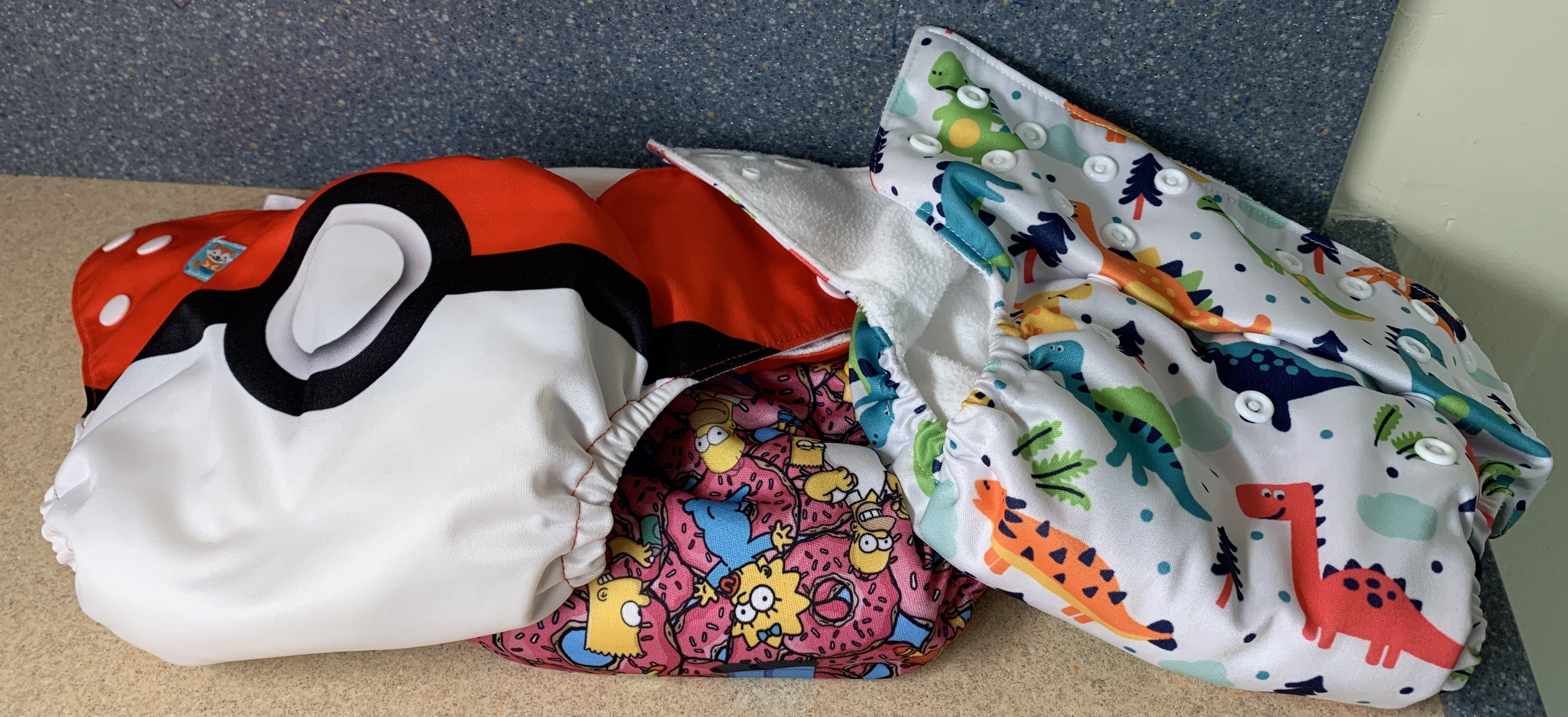
Cloth Diapers: Earth-Friendly and Budget-Savvy
The Eco-Friendly Angle
One of the most compelling reasons many parents consider cloth diapers is their eco-friendliness. Here's why cloth diapers are kinder to the planet:
Reduced Waste: Disposable diapers create a significant amount of waste that ends up in landfills. Cloth diapers, on the other hand, are reusable, which means less environmental impact and a smaller carbon footprint.
Sustainable Materials: Cloth diapers are often made from natural fibers like cotton, hemp, or bamboo, which are less likely to contain harmful chemicals compared to disposable diapers. Many disposable diapers contain chlorine, dyes, fragrances, and other potentially irritating substances that can cause diaper rash and skin sensitivities in some babies.
Potential for Long-Term Use: With proper care, cloth diapers can last for years, even through multiple children. This extends their environmental benefits and can save you money in the long run.
The Budget-Friendly Aspect
While the upfront cost of cloth diapers might seem higher, they can be budget-friendly in the long term:
Lower Daily Expenses: Yes, the initial investment for cloth diapers is more substantial, but you'll save money over time since you won't have to keep buying disposable diapers week after week.
Durability and Reusability: Cloth diapers are built to last. They can be used for multiple children and are known for their durability. This makes them a cost-effective choice if you plan to have more kids.
Resale Value: Once your baby outgrows their cloth diapers, you can often recoup some of your investment by selling them to other parents looking for budget-friendly options.
Cute and Customizable: Cloth diapers come in a wide range of adorable patterns and colors, allowing you to express your baby's personality while keeping them dry. Many parents find joy in collecting and showcasing their cloth diaper stash, turning diaper changes into a fun and creative experience.
Cloth Diapering: The Nuts and Bolts
If you're leaning towards cloth diapers, it's essential to understand the basics of cloth diapering. Here's a step-by-step guide to get you started:
Selecting Cloth Diapers: Cloth diapers come in various styles, including pre-folds, flats, fitted diapers, and all-in-ones. Research and choose the type that suits your preferences and lifestyle. Consider factors like ease of use, absorbency, and fit.
Invest in Accessories: You'll need a few essential accessories, such as diaper covers, liners, and fasteners (if not using all-in-one diapers). These accessories ensure a snug fit and help contain messes.
Prepping Cloth Diapers: Before using cloth diapers for the first time, it's essential to prep them. This usually involves washing and drying them multiple times to enhance absorbency and remove any residues.
Diaper Changing Routine: Develop a diaper-changing routine that works for you. Be sure to have a designated changing area with all your diapering supplies within arm's reach.
Storing Dirty Diapers: Invest in a diaper pail or wet bag to store soiled diapers until it's time to wash them. Many parents also use a diaper sprayer to remove solid waste before washing.
Washing Cloth Diapers: Follow the manufacturer's care instructions for washing cloth diapers. Most recommend using a cloth diaper-friendly detergent and avoiding fabric softeners and bleach.
Drying Cloth Diapers: Some cloth diapers can be air-dried, while others can go in the dryer on low heat. Check the care instructions for each diaper type.
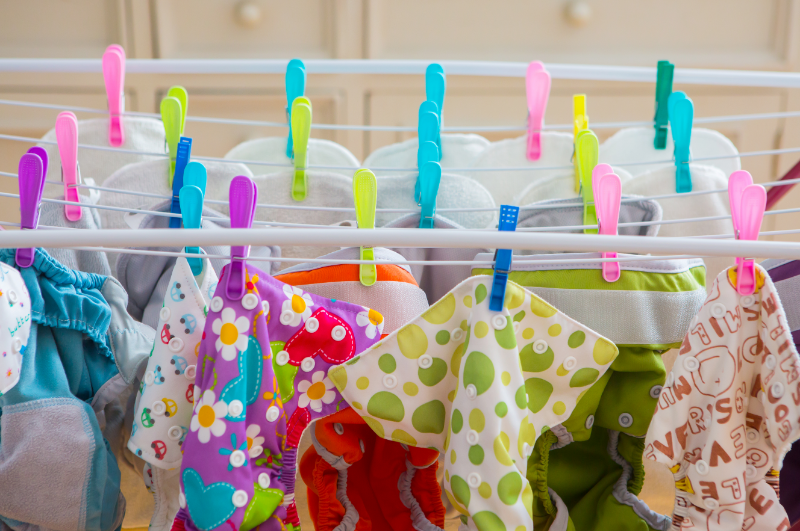
Cloth Diapers: The Nitty-Gritty Details
While cloth diapers have clear advantages, there are some practical considerations to keep in mind:
Laundry Commitment: Cloth diapers require regular washing, which means more laundry. Depending on your baby's age and the size of your diaper stash, you might do diaper laundry every few days.
Learning Curve: Using cloth diapers isn't as straightforward as using disposables. You'll need to learn how to properly fold, fasten, and care for cloth diapers. It might take some trial and error to find the system that works best for you and your baby.
Bulky Profile: Cloth diapers tend to be bulkier than disposables, making it a bit more challenging to find clothes that fit comfortably over them, especially in smaller sizes.
On-the-Go Convenience: Cloth diapers might not be the most convenient option when you're away from home. You'll need to carry wet bags for used diapers and be prepared for diaper changes on the go.
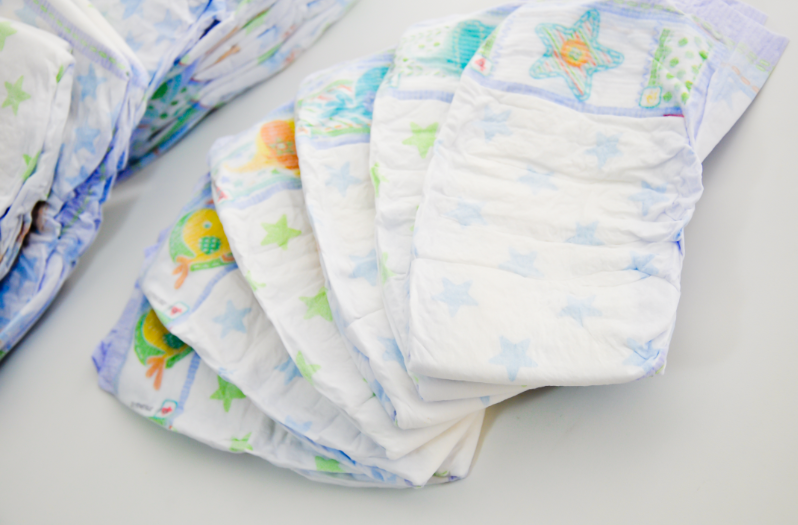
Disposable Diapers: Ultimate Convenience
The Convenience Factor
Disposable diapers are renowned for their convenience, making them a top choice for many parents:
Easy to Use: Disposable diapers are incredibly convenient. Just grab one, put it on your baby, and when it's soiled, toss it in the trash. No washing, folding, or stuffing is required.
Ideal for Travel: Disposable diapers are perfect for families on the go. You don't have to worry about carrying around dirty diapers or finding a place to wash them when you're traveling.
Less Laundry: With disposable diapers, you can say goodbye to the extra laundry associated with cloth diapers. This can be a huge relief, especially when you have a busy schedule and limited time.
The Comfort Factor
Disposable diapers have come a long way in terms of design and comfort, ensuring a cozy experience for your little one:
Stay Dry: Many disposable diapers are designed to keep your baby's skin feeling dry by quickly absorbing moisture.
Trim Fit: Disposable diapers tend to be slimmer and more form-fitting than cloth diapers, which can make them easier to fit under clothing.
Advanced Features: Some disposable diaper brands offer extra features like wetness indicators and stretchy sides for a snug fit. These can be helpful for new parents, making it easier to know when it's time for a diaper change.
Disposable Diapers: The Environmental and Financial Considerations
While disposable diapers offer convenience, there are environmental and financial aspects to consider:
Environmental Impact: Disposable diapers contribute significantly to landfill waste and require resources like water and energy for production. However, some eco-conscious brands are working to reduce their environmental impact through sustainable materials and manufacturing processes.
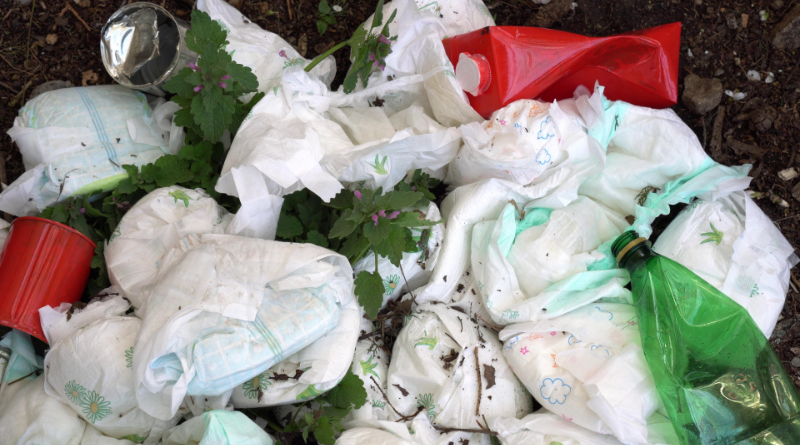
Long-term Costs: While disposable diapers don't require an initial investment like cloth diapers, the cumulative cost over your baby's diapering years can add up significantly. This is especially true if you opt for premium or organic disposable diaper brands.
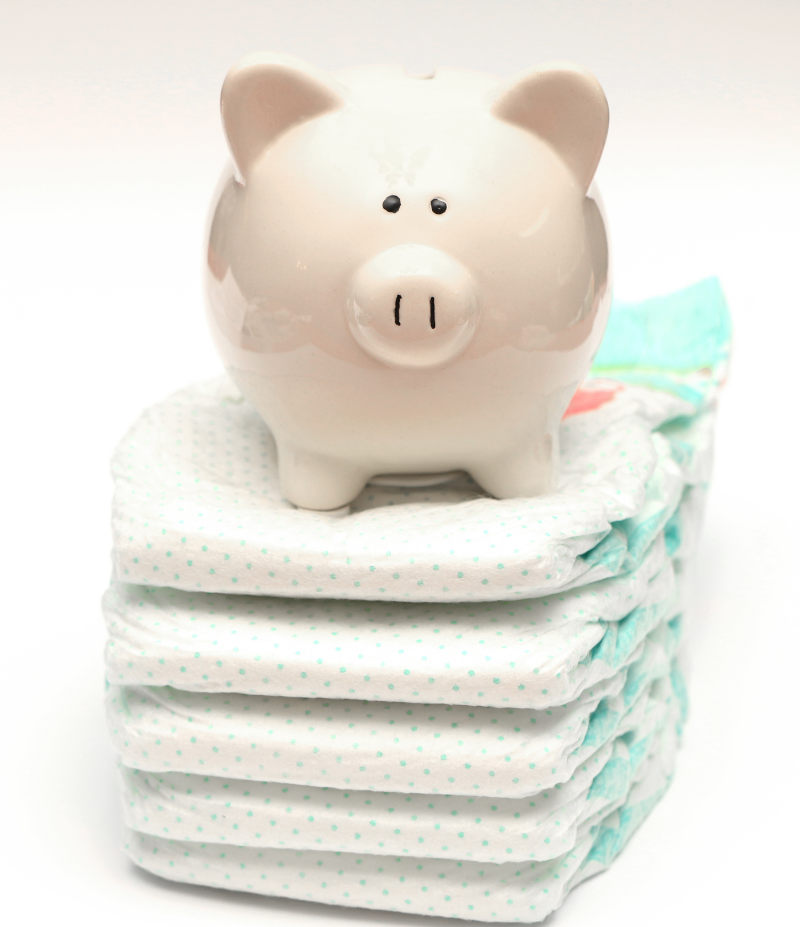
Chemical Concerns: Some disposable diapers contain chemicals like fragrances and chlorine that may irritate your baby's sensitive skin. If your baby has allergies or skin sensitivities, you might need to explore hypoallergenic options.

Finding the Right Balance
So, how do you decide between cloth diapers and disposable diapers for your infant? It ultimately depends on your family's unique circumstances and priorities:
Consider Your Lifestyle
Think about your daily routine, work schedule, and travel habits. If you have a busy lifestyle and are always on the go, disposable diapers might be the more practical choice. On the other hand, if you have more time and a willingness to do extra laundry, cloth diapers could be a great fit.
Factor in Your Budget
Consider your budget not just for the short term but for the entire duration of your baby's diapering years. If you're looking to save money in the long run, cloth diapers could be the way to go. However, if you prefer the convenience of disposables and can afford them, that's also a valid choice.
Weigh Environmental Concerns
If reducing your family's environmental footprint is a top priority, cloth diapers are the clear winner in this department. However, you can still make a more environmentally conscious choice with disposable diapers by selecting brands that prioritize sustainability.
Test the Waters
Don't be afraid to experiment. Some families use a combination of cloth and disposable diapers, depending on the situation. For instance, you might opt for cloth diapers at home and disposable diapers when you're out and about.
Seek Support and Advice
Reach out to other parents who have experience with both cloth and disposable diapers. They can provide valuable insights and tips to help you make an informed decision.
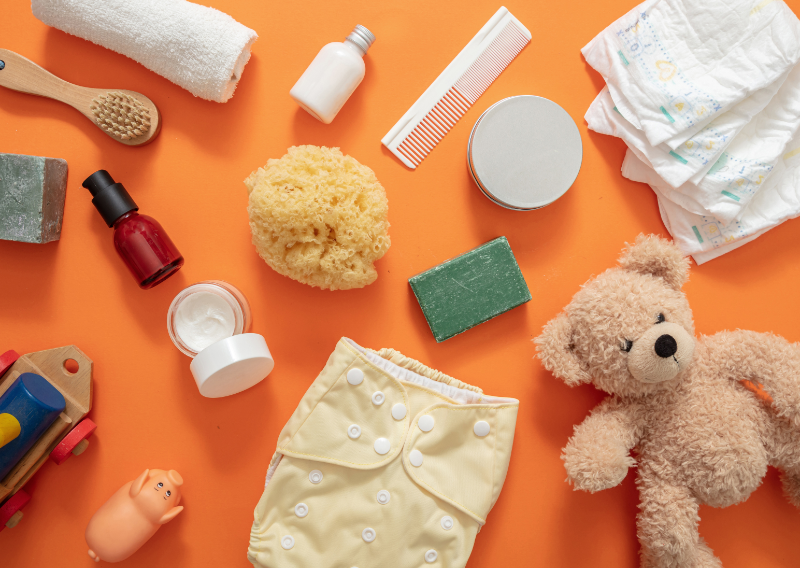
Common Concerns and Solutions
No matter which diapering method you choose, you're likely to encounter a few common concerns along the way. Here are some solutions to address them:
Diaper Rash: Diaper rash can occur with both cloth and disposable diapers. To prevent it, change your baby's diaper frequently, use a diaper cream as needed, and ensure the diaper is neither too tight nor too loose.
Leaks: Leaks can happen with any diaper. Ensure that the diaper is the correct size and properly fitted. With cloth diapers, using additional absorbent liners or boosters can help prevent leaks.
Odor: Both cloth and disposable diapers can develop odors. With cloth diapers, proper washing, and regular sunning can help keep them fresh. With disposables, consider using a diaper pail with a sealing lid to contain odors.
Sensitivity and Allergies: Some babies may have sensitivities to certain diaper materials or chemicals. If your baby experiences skin irritations, consider switching to a different diaper brand or type.
Nighttime Diapering: For overnight diapering, you may need to use a more absorbent diaper or insert, regardless of whether you choose cloth or disposable.
Potty Training: If you're interested in early potty training, consider using cloth diapers during the day to promote awareness of wetness.
Disposable and Cloth diaper recommendations
Pampers Swaddler Diapers
Wegreeco
Conclusion
In the cloth diaper vs. disposable diaper debate for your infant, there's no one-size-fits-all answer. What works for one family may not work for another. Remember that parenting is a journey filled with choices, and diapering is just one small part of it. Whether you choose cloth or disposable diapers, the most important thing is to provide your baby with love, care, and a clean, dry bottom. Happy parenting!
-
Cloth Diapers: Earth-Friendly and Budget-Savvy
- The Eco-Friendly Angle
- The Budget-Friendly Aspect
-
Cloth Diapering: The Nuts and Bolts
-
Cloth Diapers: The Nitty-Gritty Details
-
Disposable Diapers: Ultimate Convenience
-
The Convenience Factor
- The Comfort Factor
-
Disposable Diapers: The Environmental and Financial Considerations
-
Finding the Right Balance
- Consider Your Lifestyle
- Factor in Your Budget
- Weigh Environmental Concerns
- Test the Waters
- Seek Support and Advice
-
Common Concerns and Solutions
-
Disposable and Cloth diaper recommendations
-
Conclusion
Disclosure: Some of the links in this article may be affiliate links, which can provide compensation to me at no cost to you if you decide to purchase.

